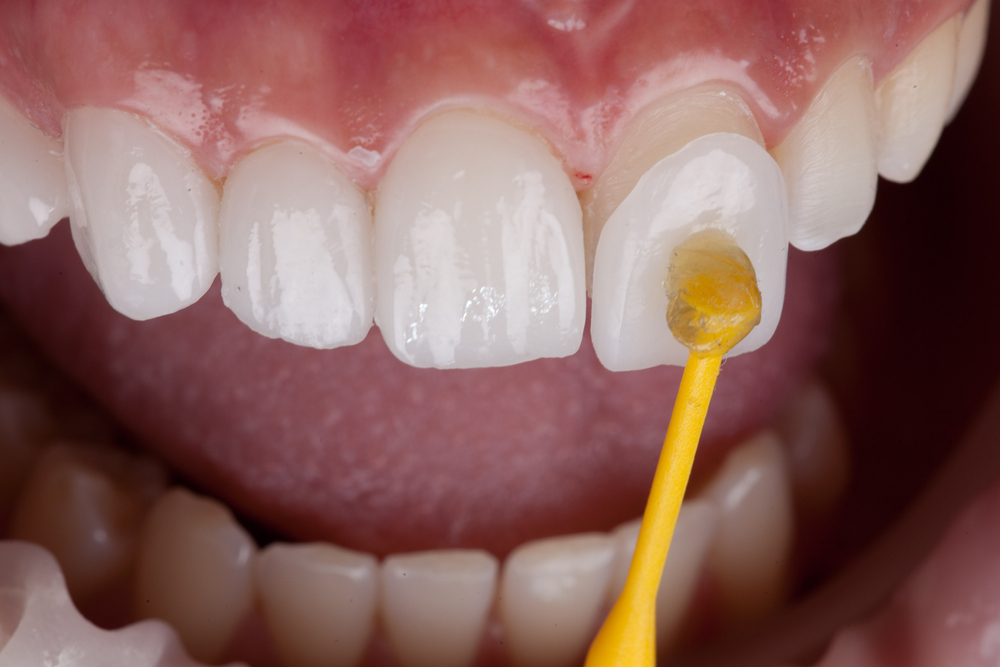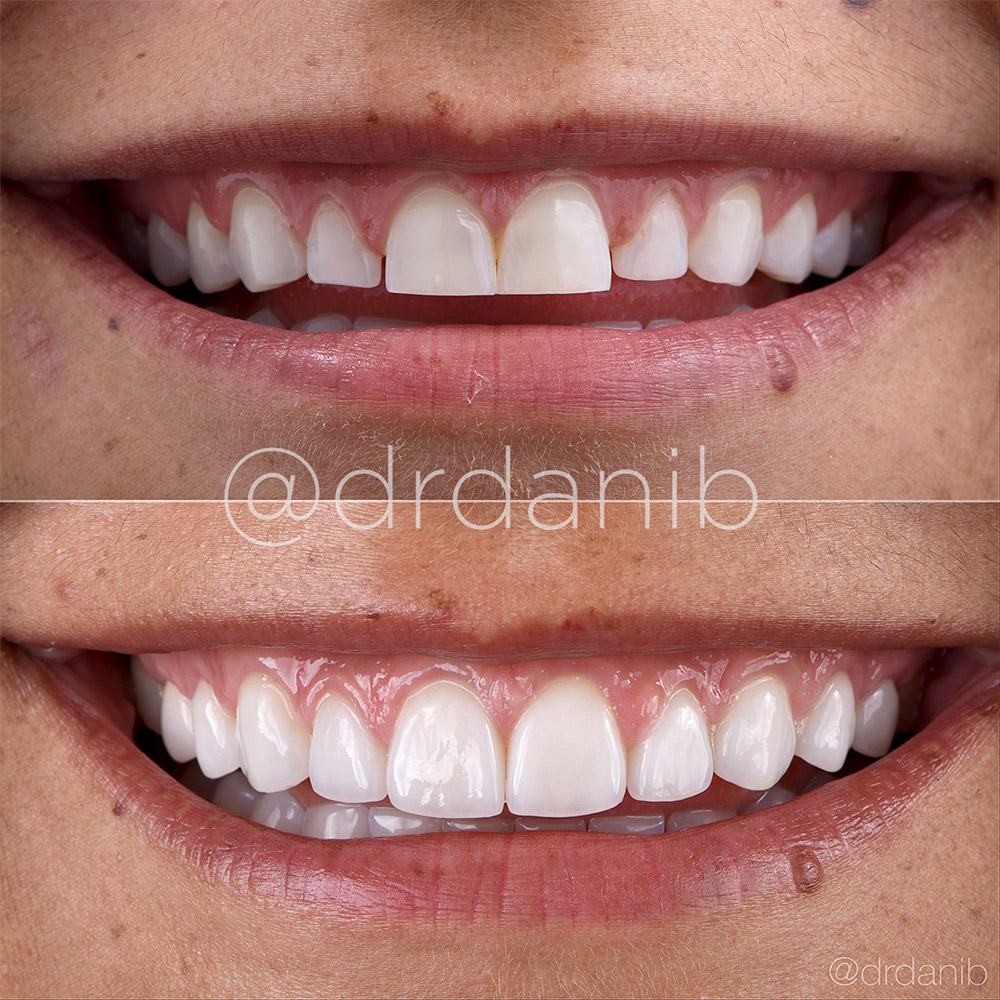The Full Introduction of Veneers: Types, Utilizes, and Their Impact on Your Smile
Veneers work as a preferred service for people looking for to improve their oral appearances. These custom-crafted shells can properly mask imperfections such as discoloration and spaces. With 2 primary types offered, porcelain and composite resin, each offers distinctive advantages and limitations. The effect of veneers expands past simple look, influencing self-worth and social communications. Understanding their advantages and kinds is essential. What might this suggest for one's total lifestyle?
Recognizing Veneers: What They Are and Exactly how They Work
Veneers are thin shells, usually made from porcelain or composite material, that are custom-crafted to fit over the front surface area of teeth. They offer both visual and useful purposes, offering a remedy for various dental blemishes such as staining, gaps, and small imbalances. By adhering to the tooth enamel, veneers create a natural look while boosting the form and shade of the teeth.
The procedure usually entails a first examination, where a dental professional assesses the patient's demands and goes over preferred end results - Dental Veneers. Following this, a very little amount of enamel may be removed to accommodate the veneer. Impacts of the teeth are after that required to ensure an exact fit. Once fabricated, the veneers are adhered firmly to the teeth utilizing a special oral adhesive. This treatment not only improves the smile's appearance yet likewise assists protect the underlying teeth from further damages, making veneers a prominent choice for numerous seeking a smile makeover
Kinds of Veneers: Porcelain vs. Compound Resin
The difference in between porcelain and composite resin veneers hinges on their product structure and characteristics. Each kind uses varying levels of sturdiness, longevity, and cost, influencing individuals' choices based upon their individual demands. Comprehending these distinctions is important for making an educated decision pertaining to dental improvements.
Material Distinctions Explained
While both porcelain and composite resin veneers offer the very same cosmetic purpose, they differ greatly in material residential or commercial properties, sturdiness, and visual end results. Porcelain veneers are crafted from a ceramic product that mimics the all-natural translucence of teeth, providing a natural appearance. Their smooth surface is resistant to discoloration, making them an enticing alternative for those looking for a durable visual. On the other hand, composite material veneers are made from a tooth-colored plastic product, offering flexibility and convenience of application. They might not attain the same degree of brightness or translucency as porcelain. Furthermore, composite veneers can be extra easily formed and fixed, making them an extra adaptable alternative in specific oral situations. Each type provides distinct benefits tailored to individual choices.
Long life and Longevity
Longevity and durability are significant factors when comparing porcelain and composite material veneers. Porcelain veneers are known for their toughness, usually enduring 10 to 15 years with appropriate care. Their durability against damaging and tarnishing makes them a popular selection for individuals looking for long-lasting results. On the other hand, composite resin veneers usually have a much shorter life-span, balancing 5 to 7 years. While they can be repaired more conveniently if damaged, they are a lot more at risk to use and staining in time. The selection between these products often depends upon the individual's way of living, aesthetic objectives, and upkeep preferences. Eventually, understanding the distinctions in longevity and longevity can guide individuals in selecting the veneer kind that best fits their demands.
Expense Contrast Insights
Cost is a critical factor to consider when selecting in between porcelain and composite material veneers. Porcelain veneers generally vary from $800 to $2,500 per tooth, reflecting their toughness, aesthetic charm, and resistance to discoloration. These veneers call for an extra considerable treatment and specialized laboratory work, adding to their higher price. On the other hand, composite resin veneers are generally much more economical, setting you back in between $250 and $1,500 per tooth. They can be used in a single browse through, which reduces labor expenses. Composite veneers might require more frequent replacements, potentially increasing long-term expenses. Inevitably, the selection between porcelain and composite resin veneers depends on private budget plans and preferred end results, stabilizing first prices against long life and visual results.
The Benefits of Picking Veneers for Your Smile
Choosing veneers provides significant benefits for those looking for a boosted smile. Their boosted visual charm can change the appearance of teeth, while their stain-resistant residential or commercial go to this website properties guarantee an enduring brightness - Porcelain Veneers Dentist. This mix makes veneers a preferred alternative for individuals wanting to attain a perfect smile
Improved Visual Allure
When people seek to improve their smiles, veneers commonly become a preferred solution due to their transformative aesthetic benefits. These thin coverings, typically constructed from porcelain or composite material, can properly conceal blemishes such as chips, gaps, and misalignment. By imitating the all-natural look of teeth, veneers offer a smooth, radiant smile. Their personalized nature enables a customized method, allowing individuals to select shades and forms that best match their facial features. In addition, veneers can create a consistent look, improving total facial proportion. This aesthetic improvement not only enhances confidence yet can also favorably influence social interactions and individual relationships, making veneers a preferred option for those looking to accomplish a brighter, a lot more eye-catching smile.
Discolor Resistance Conveniences
Veneers not just boost aesthetic charm but also use considerable tarnish resistance, making them an attractive choice for individuals worried regarding preserving a bright smile. Composed of durable materials such as porcelain or composite material, veneers are much less permeable than all-natural teeth, which helps stop the absorption of stains from common offenders like coffee, tea, and merlot. This inherent discolor resistance enables people to enjoy their favorite beverages without fretting about staining. Porcelain Veneers. Additionally, the smooth surface of veneers makes them simpler to tidy, additional improving their long life and maintaining their beautiful appearance. Therefore, veneers supply a functional remedy for those looking for both appeal and capability in their oral care
The Process of Obtaining Veneers: What to Anticipate

Although the procedure of obtaining veneers might seem challenging, understanding the steps entailed can relieve concerns. Initially, an examination with a dentist is useful content essential to determine if veneers are the suitable solution for the individual's oral problems. Throughout this appointment, the dental professional will certainly discuss preferred end results and take perceptions of the teeth.
Next, a second consultation is arranged for tooth preparation, where a small amount of enamel is generally gotten rid of to fit the veneers. Temporary veneers might be placed while the custom-made ones are crafted in a dental laboratory, which usually takes a number of weeks.
As soon as prepared, the dentist will certainly place the veneers, making certain proper fit and shade prior to bonding them to the teeth utilizing an unique adhesive. After last adjustments, the dental practitioner will provide assistance on treatment. Understanding these steps can assist people feel a lot more comfy and notified throughout the veneer procedure.
Upkeep and Care for Your Veneers
Preserving veneers calls for regular like guarantee their durability and look. Proper oral health is essential; cleaning two times daily with a non-abrasive tooth paste and flossing frequently aid stop plaque build-up around the veneers. Additionally, routine oral exams are crucial for monitoring the problem of the veneers and addressing any kind of prospective concerns early on.
When biting to avoid damage, individuals must prevent difficult foods and extreme force. It's also a good idea to restrict usage of discoloring substances, such as coffee, tea, and red white wine, as these can affect the veneers' color over time.

Transforming Your Smile: Real-Life Impact of Veneers
A glowing smile can greatly boost one's self-confidence and total look. For several people, veneers offer as a transformative option, successfully attending to different dental issues such as discoloration, gaps, and imbalance. These slim shells, custom-made to fit over the front of the teeth, can develop an unified and visually pleasing smile.
Real-life situations show the profound influence veneers can have. People usually report a prompt boost in self-esteem and social communications following their treatment. The newfound confidence can bring about even more chances in professional and personal life, as individuals really feel even more inclined to involve and express themselves.
Furthermore, the mental benefits extend past simple look; lots of experience boosted psychological health as they accept their smiles. As a result, veneers not just enhance physical characteristics yet likewise add greatly to total lifestyle, underscoring their value in cosmetic dental care.
Regularly Asked Concerns
How Much Time Do Veneers Normally Last Before Requiring Replacement?
Veneers normally last between 10 to 15 years before calling for replacement. Factors such as dental health, dental habits, and the sort of product utilized can affect their durability and total sturdiness. Normal dental check-ups are a good idea.
Can Veneers Be Removed, and if So, How?
Yes, veneers can be eliminated. A dental professional commonly uses specific devices to meticulously detach them from the teeth, guaranteeing very little damages to the underlying enamel, usually followed by required modifications or reconstructions for perfect aesthetics.
Are Veneers Suitable for Everyone's Dental Condition?

Will Getting Veneers Pain or Require Anesthesia?
Obtaining veneers usually includes marginal discomfort, and lots of individuals receive local anesthetic to assure a pain-free experience. Sensitivity may happen momentarily afterward, but a lot of locate the procedure bearable and are pleased with the outcomes.
Just How Do Veneers Affect Tooth Level Of Sensitivity After Placement?
Veneers can temporarily raise tooth level of sensitivity as a result of the removal of enamel and the bonding procedure. The majority of people experience a decrease in level of sensitivity with time as the teeth adjust to the new veneers.
Veneers are thin shells, normally made from porcelain or composite material, that are custom-crafted to fit over the front surface of teeth. Porcelain veneers are crafted from a ceramic product that mimics the all-natural transparency of teeth, offering a natural appearance. Porcelain veneers generally vary from $800 to $2,500 per tooth, reflecting their toughness, aesthetic charm, and resistance to discoloration. In contrast, composite resin veneers are normally much more inexpensive, costing between $250 and $1,500 per tooth. Composed of long lasting materials such as porcelain or composite material, veneers are much less porous than all-natural teeth, which assists avoid the absorption of discolorations from common culprits like coffee, tea, and red wine.